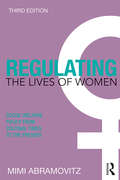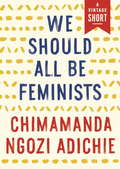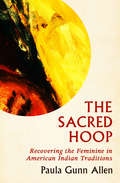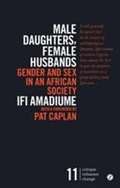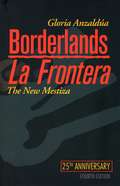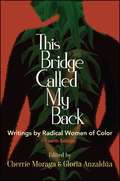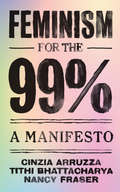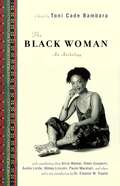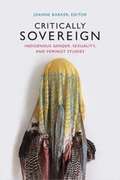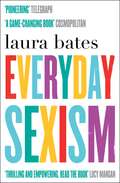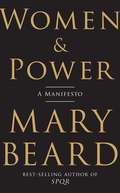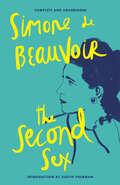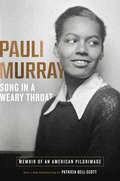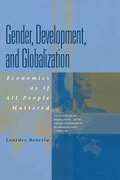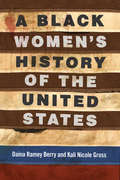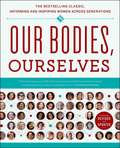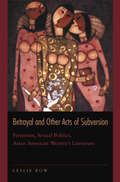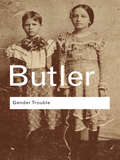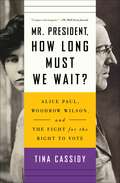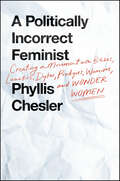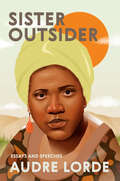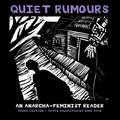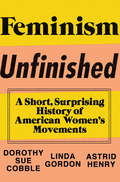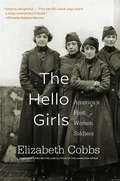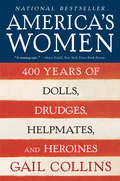Special Collections
NYPL's 2020 Essential Reads on Feminism for Adults
Description: This NYPL list includes first-hand accounts and histories of the suffrage movement that chronicle both its successes and its limitations, as well as contemporary essays on how feminism intersects with race, class, education, and LGBTQ+ activism. #adults
- Table View
- List View
Regulating the Lives of Women
by Mimi AbramovitzWidely praised as an outstanding contribution to social welfare and feminist scholarship, Regulating the Lives of Women (1988, 1996) was one of the first books to apply a race and gender lens to the U.S. welfare state. The first two editions successfully exposed how myths and stereotypes built into welfare state rules and regulations define women as "deserving" or "undeserving" of aid depending on their race, class, gender, and marital status. Based on considerable new research, the preface to this third edition explains the rise of Neoliberal policies in the mid-1970s, the strategies deployed since then to dismantle the welfare state, and the impact of this sea change on women and the welfare state after 1996. Published upon the twentieth anniversary of "welfare reform," Regulating the Lives of Women offers a timely reminder that public policy continues to punish poor women, especially single mothers-of-color for departing from prescribed wife and mother roles.
The book will appeal to undergraduate, graduate, and postgraduate students of social work, sociology, history, public policy, political science, and women, gender, and black studies – as well as today’s researchers and activists.
We Should All Be Feminists
by Chimamanda Ngozi AdichieAn eBook short.What does "feminism" mean today? That is the question at the heart of We Should All Be Feminists, a personal, eloquently-argued essay--adapted from her much-viewed Tedx talk of the same name--by Chimamanda Ngozi Adichie, the award-winning author of Americanah and Half of a Yellow Sun. With humor and levity, here Adichie offers readers a unique definition of feminism for the twenty-first century--one rooted in inclusion and awareness. She shines a light not only on blatant discrimination, but also the more insidious, institutional behaviors that marginalize women around the world, in order to help readers of all walks of life better understand the often masked realities of sexual politics. Throughout, she draws extensively on her own experiences--in the U.S., in her native Nigeria, and abroad--offering an artfully nuanced explanation of why the gender divide is harmful for women and men, alike. Argued in the same observant, witty and clever prose that has made Adichie a bestselling novelist, here is one remarkable author's exploration of what it means to be a woman today--and an of-the-moment rallying cry for why we should all be feminists.
The Sacred Hoop
by Paula Gunn AllenAlmost thirty years after its initial publication, Paula Gunn Allen&’s celebrated study of women&’s roles in Native American culture, history, and traditions continues to influence writers and scholars in Native American studies, women&’s studies, queer studies, religion and spirituality, and beyond This groundbreaking collection of seventeen essays investigates and celebrates Native American traditions, with special focus on the position of the American Indian woman within those customs. Divided into three sections, the book discusses literature and authors, history and historians, sovereignty and revolution, and social welfare and public policy, especially as those subjects interact with the topic of Native American women. Poet, academic, biographer, critic, activist, and novelist Paula Gunn Allen was a leader and trailblazer in the field of women&’s and Native American spirituality. Her work is both universal and deeply personal, examining heritage, anger, racism, homophobia, Eurocentrism, and the enduring spirit of the American Indian.
Male Daughters, Female Husbands
by Ifi AmadiumeIn 1987, more than a decade before the dawn of queer theory, Ifi Amadiume wrote Male Daughters, Female Husbands, to critical acclaim. This compelling and highly original book frees the subject position of 'husband' from its affiliation with men, and goes on to do the same for other masculine attributes, dislocating sex, gender and sexual orientation.
Boldly arguing that the notion of gender, as constructed in Western feminist discourse, did not exist in Africa before the colonial imposition of a dichotomous understanding of sexual difference, Male Daughters, Female Husbands examines the structures in African society that enabled people to achieve power, showing that roles were not rigidly masculinized nor feminized. At a time when gender and queer theory are viewed by some as being stuck in an identity-politics rut, this outstanding study not only warns against the danger of projecting a very specific, Western notion of difference onto other cultures, but calls us to question the very concept of gender itself.
Borderlands / La Frontera
by Gloria Anzaldúa and Aída Hurtado and Norma CantuRooted in Gloria Anzaldúa's experience as a Chicana, a lesbian, an activist, and a writer, the essays and poems in this volume profoundly challenged, and continue to challenge, how we think about identity.
Borderlands / La Frontera remaps our understanding of what a "border" is, presenting it not as a simple divide between here and there, us and them, but as a psychic, social, and cultural terrain that we inhabit, and that inhabits all of us.
This twenty-fifth anniversary edition features a new introduction by scholars Norma Cantú (University of Texas at San Antonio) and Aída Hurtado (University of California at Santa Cruz) as well as a revised critical bibliography.
Gloria Anzaldúa was a Chicana-tejana-lesbian-feminist poet, theorist, and fiction writer from south Texas. She was the editor of the critical anthology Making Face/Making Soul: Haciendo Caras (Aunt Lute Books, 1990), co-editor of This Bridge Called My Back: Writings by Radical Women of Color, and winner of the Before Columbus Foundation American Book Award. She taught creative writing, Chicano studies, and feminist studies at University of Texas, San Francisco State University, Vermont College of Norwich University, and University of California Santa Cruz.
Anzaldúa passed away in 2004 and was honored around the world for shedding visionary light on the Chicana experience by receiving the National Association for Chicano Studies Scholar Award in 2005. Gloria was also posthumously awarded her doctoral degree in literature from the University of California, Santa Cruz. A number of scholarships and book awards, including the Anzaldúa Scholar Activist Award and the Gloria E. Anzaldúa Award for Independent Scholars, are awarded in her name every year.
This Bridge Called My Back
by Gloria Anzaldúa and Cherríe MoragaOriginally released in 1981, This Bridge Called My Back is a testimony to women of color feminism as it emerged in the last quarter of the twentieth century. Through personal essays, criticism, interviews, testimonials, poetry, and visual art, the collection explores, as coeditor Cherríe Moraga writes, “the complex confluence of identities—race, class, gender, and sexuality—systemic to women of color oppression and liberation.”
Reissued here, nearly thirty-five years after its inception, the fourth edition contains an extensive new introduction by Moraga, along with a previously unpublished statement by Gloria Anzaldúa. The new edition also includes visual artists whose work was produced during the same period as Bridge, including Betye Saar, Ana Mendieta, and Yolanda López, as well as current contributor biographies. Bridge continues to reflect an evolving definition of feminism, one that can effectively adapt to, and help inform an understanding of the changing economic and social conditions of women of color in the United States and throughout the world.
Feminism for the 99%
by Nancy Fraser and Cinzia Arruzza and Tithi BhattacharyaNamed one of Vogue’s “Most Anticipated Books of 2019”
This is a manifesto for the 99 percent
Unaffordable housing, poverty wages, inadequate healthcare, border policing, climate change—these are not what you ordinarily hear feminists talking about. But aren’t they the biggest issues for the vast majority of women around the globe?
Taking as its inspiration the new wave of feminist militancy that has erupted globally, this manifesto makes a simple but powerful case: feminism shouldn’t start—or stop—with the drive to have women represented at the top of their professions. It must focus on those at the bottom, and fight for the world they deserve. And that means targeting capitalism. Feminism must be anticapitalist, eco-socialist and antiracist.
The Black Woman
by Toni Cade Bambara and Eleanor W TraylorA collection of early, emerging works from some of today's most celebrated African American female writers When it was first published in 1970, The Black Woman introduced readers to an astonishing new wave of voices that demanded to be heard. In this groundbreaking volume of original essays, poems, and stories, a chorus of outspoken women -- many who would become leaders in their fields: bestselling novelist Alice Walker, poets Audre Lorde and Nikki Giovanni, writer Paule Marshall, activist Grace Lee Boggs, and musician Abbey Lincoln among them -- tackled issues surrounding race and sex, body image, the economy, politics, labor, and much more. Their words still resonate with truth, relevance, and insight today.
Critically Sovereign
by Joanne BarkerCritically Sovereign traces the ways in which gender is inextricably a part of Indigenous politics and U.S. and Canadian imperialism and colonialism. The contributors show how gender, sexuality, and feminism work as co-productive forces of Native American and Indigenous sovereignty, self-determination, and epistemology. Several essays use a range of literary and legal texts to analyze the production of colonial space, the biopolitics of “Indianness,” and the collisions and collusions between queer theory and colonialism within Indigenous studies.
Others address the U.S. government’s criminalization of traditional forms of Diné marriage and sexuality, the Iñupiat people's changing conceptions of masculinity as they embrace the processes of globalization, Hawai‘i’s same-sex marriage bill, and stories of Indigenous women falling in love with non-human beings such as animals, plants, and stars. Following the politics of gender, sexuality, and feminism across these diverse historical and cultural contexts, the contributors question and reframe the thinking about Indigenous knowledge, nationhood, citizenship, history, identity, belonging, and the possibilities for a decolonial future.
Contributors. Jodi A. Byrd, Joanne Barker, Jennifer Nez Denetdale, Mishuana Goeman, J. Kehaulani Kauanui, Melissa K. Nelson, Jessica Bissett Perea, Mark Rifkin
Everyday Sexism
by Laura Bates'If Caitlin Moran's How To Be A Womanis the fun-filled manual for female survival in the 21st century, everyday sexism is its more politicised sister' (Independent on Sunday).
After experiencing a series of escalating sexist incidents, Laura Bates started the everyday sexism project and has gone on to write 'a pioneering analysis of modern day misogyny' (Telegraph).After an astounding response from the wide range of stories that came pouring in from all over the world, the project quickly became one of the biggest social media success stories of the internet. From being harassed and wolf-whistled at on the street, to discrimination in the workplace and serious sexual assault, it is clear that sexism had become normalised.
But Bates inspires women to lead a real change and writes this 'extremely powerful book that could, and should, win hearts and minds right across the spectrum' (Financial Times). Often shocking, sometimes amusing and always poignant, everyday sexism is a protest against inequality and a manifesto for change. It's 'a game-changing book, a must-read for every woman' (Cosmopolitan).'Admirable and culturally transferable. "A storm is coming," writes Bates. After reading this book you'll hope so' (Independent). Welcome to the fourth wave of feminism.
Women & Power
by Mary BeardA NEW YORK TIMES BESTSELLER "A modern feminist classic."—The Guardian
From the internationally acclaimed classicist and New York Times best-selling author comes this timely manifesto on women and power.
At long last, Mary Beard addresses in one brave book the misogynists and trolls who mercilessly attack and demean women the world over, including, very often, Mary herself. In Women & Power, she traces the origins of this misogyny to its ancient roots, examining the pitfalls of gender and the ways that history has mistreated strong women since time immemorial. As far back as Homer’s Odyssey, Beard shows, women have been prohibited from leadership roles in civic life, public speech being defined as inherently male. From Medusa to Philomela (whose tongue was cut out), from Hillary Clinton to Elizabeth Warren (who was told to sit down), Beard draws illuminating parallels between our cultural assumptions about women’s relationship to power—and how powerful women provide a necessary example for all women who must resist being vacuumed into a male template. With personal reflections on her own online experiences with sexism, Beard asks: If women aren’t perceived to be within the structure of power, isn’t it power itself we need to redefine? And how many more centuries should we be expected to wait?
The Second Sex
by Simone De BeauvoirThe essential masterwork that has provoked and inspired generations of men and women. &“From Eve&’s apple to Virginia Woolf&’s room of her own, Beauvoir&’s treatise remains an essential rallying point, urging self-sufficiency and offering the fruit of knowledge.&” —VogueThis unabridged edition reinstates significant portions of the original French text that were cut in the first English translation. Vital and groundbreaking, Beauvoir&’s pioneering and impressive text remains as pertinent today as when it was first published, and will continue to provoke and inspire generations of men and women to come.
Song in a Weary Throat
by Patricia Bell-Scott and Pauli MurrayA prophetic memoir by the activist who “articulated the intellectual foundations” (The New Yorker) of the civil rights and women’s rights movements.
First published posthumously in 1987, Pauli Murray’s Song in a Weary Throat was critically lauded, winning the Robert F. Kennedy Book Award and the Lillian Smith Book Award among other distinctions. Yet Murray’s name and extraordinary influence receded from view in the intervening years; now they are once again entering the public discourse. At last, with the republication of this “beautifully crafted” memoir, Song in a Weary Throat takes its rightful place among the great civil rights autobiographies of the twentieth century. In a voice that is energetic, wry, and direct, Murray tells of a childhood dramatically altered by the sudden loss of her spirited, hard-working parents. Orphaned at age four, she was sent from Baltimore to segregated Durham, North Carolina, to live with her unflappable Aunt Pauline, who, while strict, was liberal-minded in accepting the tomboy Pauli as “my little boy-girl.” In fact, throughout her life, Murray would struggle with feelings of sexual “in-betweenness”—she tried unsuccessfully to get her doctors to give her testosterone—that today we would recognize as a transgendered identity.
We then follow Murray north at the age of seventeen to New York City’s Hunter College, to her embrace of Gandhi’s Satyagraha—nonviolent resistance—and south again, where she experienced Jim Crow firsthand. An early Freedom Rider, she was arrested in 1940, fifteen years before Rosa Parks’ disobedience, for sitting in the whites-only section of a Virginia bus. Murray’s activism led to relationships with Thurgood Marshall and Eleanor Roosevelt—who respectfully referred to Murray as a “firebrand”—and propelled her to a Howard University law degree and a lifelong fight against "Jane Crow" sexism. We also read Betty Friedan’s enthusiastic response to Murray’s call for an NAACP for Women—the origins of NOW. Murray sets these thrilling high-water marks against the backdrop of uncertain finances, chronic fatigue, and tragic losses both private and public, as Patricia Bell-Scott’s engaging introduction brings to life.
Now, more than thirty years after her death in 1985, Murray—poet, memoirist, lawyer, activist, and Episcopal priest—gains long-deserved recognition through a rediscovered memoir that serves as a “powerful witness” (Brittney Cooper) to a pivotal era in the American twentieth century.
Gender, Development and Globalization
by Lourdes BeneriaWith Cold War politics lost as the organizing principle behind international politics, development has become the most import policy goal of every international organization. There is an underside (and a human side) to development, and feminism has made inroads into the highly technical debates and frothy prophecies by examining what the future really holds for the people who will live it.
This book highlights the ways in which feminist analysis has contributed to a richer understanding of international development and globalization. By combining theoretical, empirical, and political perspectives and discussing cutting-edge debates around development, globalization, economic restructuring, and feminist economics, Gender, Development and Globalization presents the ultimate primer on global feminist economics.
A Black Women's History of the United States
by Daina Ramey Berry and Kali Nicole GrossA vibrant and empowering history that emphasizes the perspectives and stories of African American women to show how they are--and have always been--instrumental in shaping our country
In centering Black women's stories, two award-winning historians seek both to empower African American women and to show their allies that Black women's unique ability to make their own communities while combatting centuries of oppression is an essential component in our continued resistance to systemic racism and sexism. Daina Ramey Berry and Kali Nicole Gross offer an examination and celebration of Black womanhood, beginning with the first African women who arrived in what became the United States to African American women of today.
A Black Women's History of the United States reaches far beyond a single narrative to showcase Black women's lives in all their fraught complexities. Berry and Gross prioritize many voices: enslaved women, freedwomen, religious leaders, artists, queer women, activists, and women who lived outside the law. The result is a starting point for exploring Black women's history and a testament to the beauty, richness, rhythm, tragedy, heartbreak, rage, and enduring love that abounds in the spirit of Black women in communities throughout the nation.
Our Bodies, Ourselves
by Judy Norsigian and Boston Women's Health Book CollectiveHailed by The New York Times as a "feminist classic," and "America's bestselling book on women's health," the comprehensive guide to all aspects of women's health and sexuality, including menopause, birth control, childbirth, sexual health, sexual orientation, gender identity, mental health and general well-being.
Six years after the 2005 overhaul of this classic guide to women's health, the 2011 edition focuses on what Our Bodies, Ourselves does best: provide information on women's reproductive health and sexuality; practical information on how find and access health information; and resources, stories, and information to educate women about health care injustices and inspire them to work collectively to address them.
This new edition of Our Bodies, Ourselves includes the latest vital information on: *Changes in the health care system--especially how health care reform affects women and how to get the care you need. * Safer sex--how to engage in pleasurable, satisfying sexual experiences while protecting your health and the health of your partner. * Environmental health risks--including minimizing exposure to everyday pollutants that endanger reproductive health. * Body image--resisting negative media stereotypes and embracing healthier approaches to looking and feeling good. * Local and global activism--using social media and organizing tactics to build community and advocate for policies that improve women's lives. * As well as crucial information about gender identity, sexual orientation, birth control, abortion, pregnancy and birth, perimenopause, and sexuality and sexual health as we age. Together with its companion website, OurBodiesOurselves.org, Our Bodies, Ourselves is a one-stop resource for women of all generations.
Betrayal and Other Acts of Subversion
by Leslie BowAsian American women have long dealt with charges of betrayal within and beyond their communities. Images of their "disloyalty" pervade American culture, from the daughter who is branded a traitor to family for adopting American ways, to the war bride who immigrates in defiance of her countrymen, to a figure such as Yoko Ono, accused of breaking up the Beatles with her "seduction" of John Lennon. Leslie Bow here explores how representations of females transgressing the social order play out in literature by Asian American women. Questions of ethnic belonging, sexuality, identification, and political allegiance are among the issues raised by such writers as Jeanne Wakatsuki Houston, Bharati Mukherjee, Jade Snow Wong, Amy Tan, Sky Lee, Le Ly Hayslip, Wendy Law-Yone, Fiona Cheong, and Nellie Wong. Beginning with the notion that feminist and Asian American identity are mutually exclusive, Bow analyzes how women serve as boundary markers between ethnic or national collectives in order to reveal the male-based nature of social cohesion. In exploring the relationship between femininity and citizenship, liberal feminism and American racial discourse, and women's domestic abuse and human rights, the author suggests that Asian American women not only mediate sexuality's construction as a determiner of loyalty but also manipulate that construction as a tool of political persuasion in their writing. The language of betrayal, she argues, offers a potent rhetorical means of signaling how belonging is policed by individuals and by the state. Bow's bold analysis exposes the stakes behind maintaining ethnic, feminist, and national alliances, particularly for women who claim multiple loyalties.
Gender Trouble
by Judith ButlerOne of the most talked-about scholarly works of the past fifty years, Judith Butler’s Gender Trouble is as celebrated as it is controversial. Arguing that traditional feminism is wrong to look to a natural, 'essential' notion of the female, or indeed of sex or gender, Butler starts by questioning the category 'woman' and continues in this vein with examinations of 'the masculine' and 'the feminine'. Best known however, but also most often misinterpreted, is Butler's concept of gender as a reiterated social performance rather than the expression of a prior reality. Thrilling and provocative, few other academic works have roused passions to the same extent.
Mr. President, How Long Must We Wait?
by Tina CassidyIn this &“heroic narrative&” (The Wall Street Journal), discover the inspiring and timely account of the complex relationship between leading suffragist Alice Paul and President Woodrow Wilson in her fight for women&’s equality. Woodrow Wilson lands in Washington, DC, in March of 1913, a day before he is set to take the presidential oath of office. He is surprised by the modest turnout. The crowds and reporters are blocks away from Union Station, watching a parade of eight thousand suffragists on Pennsylvania Avenue in a first-of-its-kind protest organized by a twenty-five-year-old activist named Alice Paul. The next day, The New York Times calls the procession &“one of the most impressively beautiful spectacles ever staged in this country.&” Mr. President, How Long Must We Wait? weaves together two storylines: the trajectories of Alice Paul and Woodrow Wilson, two apparent opposites. Paul&’s procession of suffragists resulted in her being granted a face-to-face meeting with President Wilson, one that would lead to many meetings and much discussion, but little progress for women. With no equality in sight and patience wearing thin, Paul organized the first group to ever picket in front of the White House lawn—night and day, through sweltering summer mornings and frigid fall nights. From solitary confinement, hunger strikes, and the psychiatric ward to ever more determined activism, Mr. President, How Long Must We Wait? reveals the courageous, near-death journey it took, spearheaded in no small part by Alice Paul&’s leadership, to grant women the right to vote in America. &“A remarkable tale&” (Kirkus Reviews) and a rousing portrait of a little-known feminist heroine, this is an eye-opening exploration of a crucial moment in American history one century before the Women&’s March.
A Politically Incorrect Feminist
by Phyllis CheslerA powerful and revealing memoir about the pioneers of modern-day feminismPhyllis Chesler was a pioneer of Second Wave Feminism. Chesler and the women who came out swinging between 1972-1975 integrated the want ads, brought class action lawsuits on behalf of economic discrimination, opened rape crisis lines and shelters for battered women, held marches and sit-ins for abortion and equal rights, famously took over offices and buildings, and pioneered high profile Speak-outs. They began the first-ever national and international public conversations about birth control and abortion, sexual harassment, violence against women, female orgasm, and a woman’s right to kill in self-defense. Now, Chesler has juicy stories to tell. The feminist movement has changed over the years, but Chesler knew some of its first pioneers, including Gloria Steinem, Kate Millett, Flo Kennedy, and Andrea Dworkin. These women were fierce forces of nature, smoldering figures of sin and soul, rock stars and action heroes in real life. Some had been viewed as whores, witches, and madwomen, but were changing the world and becoming major players in history. In A Politically Incorrect Feminist, Chesler gets chatty while introducing the reader to some of feminism's major players and world-changers.
Sister Outsider
by Audre Lorde and Cheryl ClarkePresenting the essential writings of black lesbian poet and feminist writer Audre Lorde, SISTER OUTSIDER celebrates an influential voice in twentieth-century literature. In this charged collection of fifteen essays and speeches, Lorde takes on sexism, racism, ageism, homophobia, and class, and propounds social difference as a vehicle for action and change. Her prose is incisive, unflinching, and lyrical, reflecting struggle but ultimately offering messages of hope. This commemorative edition includes a new foreword by Lorde scholar and poet Cheryl Clarke, who celebrates the ways in which Lorde's philosophies resonate more than twenty years after they were first published. These landmark writings are, in Lorde's own words, a call to "never close our eyes to the terror, to the chaos which is Black which is creative which is female which is dark which is rejected which is messy which is. ..."
Reviews: "...it's been almost a quarter of a century since Audre Lorde's essays and speeches in Sister Outsider made an indelible mark on 20th-century literature. But the words of the black lesbian feminist poet seem as lyrical and unforgettable, and, sadly, as relevant today as when she first tackled everything from racism and homophobia to ageism and class dichotomies. A must-have book that every lesbian should read."--Curve Editor's Pick. "Lorde was a brilliant feminist poet and intellectual whose theories on the power of embracing our internal contradictions as well as the differences between people and groups is the way to powerful coalition building and social progress." --New York Post, Sunday. "Poet and librarian Lorde collected 15 of her finest essays and speeches in this 1984 volume. With her poet's command of language, she addresses sexism, racism, black women, black lesbians, eroticism, and more. Still powerful."--Library Journal, Starred Review. "Audre Lorde is a passionate sage. I say 'is' and not 'was' because her keen insights continue to provoke and sustain us and give us courage. The reissue of this book is a gift to longtime admirers and to new readers who have yet to discover the power and grace and splendid audacity of Audre Lorde."--Valerie Miner, author of After Eden and professor of feminist studies at Stanford University. "[Lorde's] works will be important to those truly interested in growing up sensitive, intelligent, and aware."--New York Times.
Quiet Rumours
by Emma Goldman and Dark Star Collective and Roxanne Dunbar-Ortiz and Jo Freeman and Voltairine De CleyreThis is a fascinating window into the development of the women's movement in the words of those who moved it. Compiled and introduced by the UK-based anarchist-intellectual collective Dark Star, Quiet Rumours features articles and essays from four generations of anarchist-inspired feminists, including Emma Goldman, Voltairine de Cleyre, Jo Freeman, Peggy Kornegger, Cathy Levine, Roxanne Dunbar-Ortiz, Mujeres Creando, Rote Zora, and beyond. All the pieces from the first two editions are included here, as well as new material bringing third and so-called fourth-wave feminism into conversation with twenty-first century politics. An ideal overview for budding feminists and an exciting reconsideration for seasoned radicals.
Feminism Unfinished
by Dorothy Sue Cobble and Linda Gordon and Astrid HenryReframing feminism for the twenty-first century, this bold and essential history stands up against "bland corporate manifestos" (Sarah Leonard).
Eschewing the conventional wisdom that places the origins of the American women's movement in the nostalgic glow of the late 1960s, Feminism Unfinished traces the beginnings of this seminal American social movement to the 1920s, in the process creating an expanded, historical narrative that dramatically rewrites a century of American women's history. Also challenging the contemporary "lean-in," trickle-down feminist philosophy and asserting that women's histories all too often depoliticize politics, labor issues, and divergent economic circumstances, Dorothy Sue Cobble, Linda Gordon, and Astrid Henry demonstrate that the post-Suffrage women's movement focused on exploitation of women in the workplace as well as on inherent sexual rights. The authors carefully revise our "wave" vision of feminism, which previously suggested that there were clear breaks and sharp divisions within these media-driven "waves." Showing how history books have obscured the notable activism by working-class and minority women in the past, Feminism Unfinished provides a much-needed corrective.
The Hello Girls
by Elizabeth CobbsIn 1918 the U.S. Army Signal Corps sent 223 women to France to help win World War I. Elizabeth Cobbs reveals the challenges these patriotic young women faced in a war zone where male soldiers resented, wooed, mocked, saluted, and ultimately celebrated them. Back on the home front, they fought the army for veterans’ benefits and medals, and won.
America's Women
by Gail CollinsAmerica's Women tells the story of more than four centuries of history. It features a stunning array of personalities, from the women peering worriedly over the side of the Mayflower to feminists having a grand old time protesting beauty pageants and bridal fairs. Courageous, silly, funny, and heartbreaking, these women shaped the nation and our vision of what it means to be female in America.
By culling the most fascinating characters -- the average as well as the celebrated -- Gail Collins, the editorial page editor at the New York Times, charts a journey that shows how women lived, what they cared about, and how they felt about marriage, sex, and work. She begins with the lost colony of Roanoke and the early southern "tobacco brides" who came looking for a husband and sometimes -- thanks to the stupendously high mortality rate -- wound up marrying their way through three or four. Spanning wars, the pioneering days, the fight for suffrage, the Depression, the era of Rosie the Riveter, the civil rights movement, and the feminist rebellion of the 1970s, America's Women describes the way women's lives were altered by dress fashions, medical advances, rules of hygiene, social theories about sex and courtship, and the ever-changing attitudes toward education, work, and politics. While keeping her eye on the big picture, Collins still notes that corsets and uncomfortable shoes mattered a lot, too.
"The history of American women is about the fight for freedom," Collins writes in her introduction, "but it's less a war against oppressive men than a struggle to straighten out the perpetually mixed message about women's roles that was accepted by almost everybody of both genders."
Told chronologically through the compelling stories of individual lives that, linked together, provide a complete picture of the American woman's experience, America's Women is both a great read and a landmark work of history.
